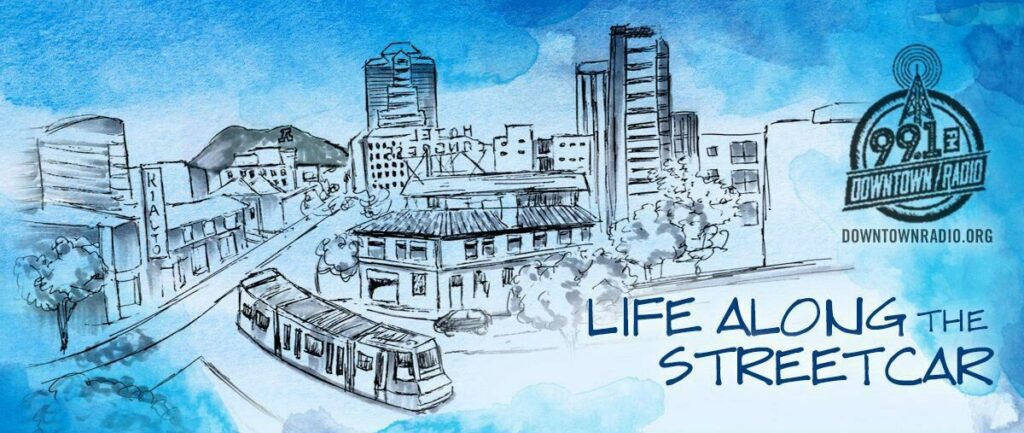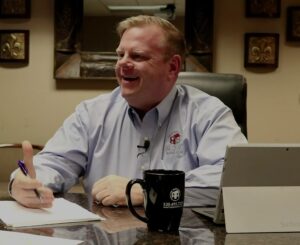Transcript
Tom Heath
Good morning. It’s a beautiful son in the Old Pueblo and you’re listening to Katy DT Tucson. Thank you for spending part of your brunch shower with us, on your downtown Tucson Community sponsored Rock, n. Roll radio station
Tom Heath
This week, we speak with Andrea Buttrick of the Food Conspiracy Co-Pp on Fourth Avenue, we’re going to get a look back and a look forward on this community grocer.
Tom Heath
Today is June 27th, my name is Tom Heath and your Listening to Life along the streetcar.
Tom Heath
Each and every Sunday. Our focus is on social cultural and economic impacts in Tucson’s, Urban core and we shed light on hidden gems. Everyone should know about from a mountain to you Arizona and all stops in between. You get the inside track right here on 99.1 FM. Streaming on Downtown Radio dot org. Also available on your iPhone or Android. If you download the Downtown Radio Tucson app. If you want to get us on the show, you can reach us on our website. Along the streetcar dot org or on Facebook. You can also Now find us on Instagram because we’re cool like that our show is house, just about anywhere. You’re going to find podcasts and you can also ask your smart speaker to play Life along the streetcar podcast and see what happens. And we’re going to start Today’s Show with some news about a little Resurgence of life, kind of continuing on last week’s theme of things happening in Tucson one. To make sure you are aware that starting tomorrow. The 28th Downtown Radio is back in full force.
Tom Heath
The studio is open up and our regular DJ lineups will be happening. Can check all those out on the website, downtown a radio dot org and you know we’ve missed some of these DJs and they’re fantastically curated shows, happy that they are coming back. And man it’s going to be a great, a great week. So you probably have no reason to go anywhere but night. .1 FM or stay on Downtown Radio dot org. I have it on my app which plays in my car. So I’m pretty sure I’m not gonna be listening to anything else this week. Also news at the Fox Theater and the Rialto shows are starting back up in July. That’s just like a month away. We’re going to start seeing activity in those with a big push as we get into the fall and September, and on lots of exciting things happening. So stay tuned to Life along the streetcar as we Feature A lot of these on our upcoming shows.
Tom Heath
Food Conspiracy Co-Op on Fourth Avenue has been there for 50 years and if you’ve been down there, you know there’s an entrance on 4th Avenue and there’s some parking behind it, but sometimes we got to walk around the building to get there.
Tom Heath
Well, we found out not too long ago that they are putting in an East entrance and in exploring that we realize they are doing a huge remodel all the way over to 3rd. So we have Andrea Buttrick on the show today, we spoke with her just a couple of days ago by phone and she shared with us the importance of having the Food Conspiracy Co-Op at our community and what we can expect here in the future.
Andrea Buttrick
My name is Andrea Buttrick. I use she/her pronouns. I’m the communications coordinator at Food conspiracy Co-op and have been in this position for eight or nine months at this point, but have been employed at the co-op, for probably a sum total of seven years.
Tom Heath
The sum total of seven years. What happened? Seven years ago? They got you interested in the Co-op?
Andrea Buttrick
Well, so the the beautiful thing about the coop is how much it just sort of sinks into folks lives. So I became an owner almost immediately. When I moved to town 19 years ago and then maybe 16 years ago, I worked here briefly in the produce department, then went on to some other more career oriented jobs and then when I found myself exhausted from those ended up back at the co-op employed upfront, as a cashier. And this place Is a vibrant. Lovely Healing Place. So before long, I felt refilled and healed up and then I was promoted to the communications position. So it’s really some total of seven years over. What is that us? 16 – 18 year process?
Tom Heath
That’s fantastic. It’s like you’re, you’re calling and just you keep trying to get away but like, nope, you are supposed to. Yeah, with a co-op. So tell us a little bit. We actually feature the cop a few years ago if you can remind us. What exactly a co-op Is and why it’s important in a community?
Andrea Buttrick
Sure. So the Cooperative business model is the idea of being co-owned by our by our Shoppers. So folks can purchase equity. And at that point, they then share in profits when we make profits. But really most importantly they share in the decision making. We are a democratically run business. We have a guiding Board of course and a general manager and those two entities. Of sort of work work, parallel, and then work together to connect all of the different parts of the coop but the key really is the concept of shared ownership, shared decision-making and shared resources. So we use all that owner Equity to do the work that we do. And then that a good deal of that work is also in education with the community and connecting with local vendors. Enders and local producers. So that the products we have available are healthy and organic and serving our community in the best way they can and available to the largest number of people that we can. So we really want to open as many Pathways to healthy food for every person as is possible.
Tom Heath
Well, you mentioned, you’re an owner. So I’m guessing it’s, you had to drop down like ten fifteen thousand to get by into one of these businesses. These big grocery store chains? That how it works, right?
Andrea Buttrick
Right. So that is the absolute beauty of the that experience of shared, abundance. We’ve been talking a lot about that as we are moving into the Expansion Project and the capital campaign, the the experience of shared abundance means, we each bring what we have to bring. And in that it exponentially grows in its power. So, Equity at the coop. At this point is $180. You can pay that all at once or you can pay it in small increments over time. I’m and once you have paid that $180 in full, you are a full owner. And so it’s really that idea that we each give a little in order to be part of the much bigger hole. So it’s as available and open to as many people as we can again. And we’re always having the conversation about how we can make even that sometimes half the equity for some that 180 is pretty, pretty, quick and easy to come by, for many, it’s continues to be a struggle, and we are still And that conversation about how we can make it even more accessible to folks, but it really is that experience of shared abundance, which is such the magic of the Co-operative model and has existed throughout time. This is not a new thing that we in Tucson invented or that was invented in response to even conventional Food Systems Cooperative models have existed as long as people and culture have existed and have been really powerful in particular, amongst communities of color who Who have worked to pool resources in order to better serve serve each other in the face of systems that do not serve them.
Tom Heath
Well, for full disclosure, I am also an owner of the a good conspiracy Co-op. So I do want to share that and I do not let people know the minimum amount. I tell them I am an owner and I walk by and they think I’m a big shot so they too could be involved with that. But you mentioned these cops have been around for a while back too. On how long, how long has it been here? And how long have you been on Fourth Avenue?
Andrea Buttrick
Oh, gosh. We are celebrating our 50th Anniversary this year, which is just tremendously, mind-blowing and wonderful, and we have been 50 years in this same place on Fourth Avenue. So what folks know as our tiny little parking, lot off of half a lie. So in between 4th Avenue and Hoff Avenue, that little parking lot is where we started 50 years ago with a few friends. Friends coming together and wanting to offer an alternative to Conventional Food Systems and an alternative to offering more healthy food to folks in a way that that made it more accessible, made it more affordable. So they drove off in lots of different directions and gleaned from the ranches and farms and producers and Orchards from from around Arizona. Southern Arizona came back and swapped in the back parking lot. After a while, it got popular enough that they moved inside the building. What is now are same, same building and at that point it was still labor in exchange for food. So you came and volunteered some and and boxed and distributed food and then you’ve got to take as well, then it continued to grow. So we purchased I think we own two Bay’s of the of the front store this point. We rent the third and then most recently six, eight years ago, I’m not sure. I think that’s probably like eight ten years ago. We bought the building The other side of pasta, Alle, what used to be wingspan. So, we own that building as well. And all of that, that stretch that campus as we call it, it is going to be what is renovated in the East entrance project. But yeah, we’re talking about 50 years, on Fourth Avenue, along with all of the other amazing, small businesses and locally owned businesses that grew up in that same time in the 70s. And we’re still a part of that that nurturing historic Fourth Avenue Community,
Tom Heath
when I definitely want to talk about the capital campaign. The expansion because that blew my mind when I saw. But before we get to that, just a couple questions about the the evolution of the way, the the consume, the food conspiracy Co-op is working because I would assume 50 years ago or maybe between 50 years. And now there’s been abs and flows to local produce and organic usage, and you’ve been through all of that. But right now we’re in an area where we seem to see a lot more marketing around the importance of supporting our local producers. Has how does that play into like a an economy for health and financial reasons? How does that play into a community?
Andrea Buttrick
Yeah, so that’s a great. That’s a great and necessarily insightful question. And I’m going to be super honest. There are folks who have been here longer that can speak better to some of what has happened historically with the coop, but I will say that right now, we are absolutely who conspiracy is absolutely taking ownership and responsibility for the critical importance of elevating local producers and there’s so many reasons for that and One of them, we just experienced this past year in pandemic. The Coop suffered shortages of toilet paper like everybody else did and yeast like everybody else did. But other than that we were able to keep eggs and dairy stalked. We were able to keep vegetables stocked and the majority of our bulk availability, we change the way we shopped bulk, but we were still able to offer flowers and Grains and beans and all organic options. Options throughout that stretch of time when other grocery stores were empty and a good deal of that, had to do with the fact that our suppliers, many of them are local, which meant they were not struggling with the transportation issues that the bigger chains were struggling with, it was a much more direct relationship so that is critical and it’s what lets us know that the Co-operative model and the local model of production. And and grocery stores is is really the wave of the future. So built into our history, but it’s very much the wave of the future also. But another critical piece is that and it is part of our history that some of what the folks who originally started us were responding to is this idea that organic food was inherently more expensive and therefore only available to folks who have the resources for it and it really was especially buying in the bulk model and the labor. For food. Trade model, was really in response to that, that everybody has the right to that and that the kind of healthy organic locally, produced Heritage Food. All of the things that has have big price tags on them now.
Andrea Buttrick
That was real food. Historically when people were growing their own food and we wanted to get back to that. So it back then. But also right now we are really claiming our responsibility in making sure that organic and healthy food is available to every person in a way that is Sybil and that comes with the education to cook with it because that’s a big deal to cooking with whole ingredients is different than convenience foods and requires time that many folks may not have available that’s time as a resource as well, and really claiming our responsibility. And it’s interesting, we talk about food deserts, in town and, and in food availability culture. But one of the things, the organic food, Of did was actually create food deserts. We think we’re part of the solution but historically we’ve not done, we’ve created food deserts by making organic food, inaccessible to a good majority of people. So part of our message at this point at Food conspiracy, is to be very clear that we have been responsible for creating food deserts, and we want to change that. So, as more of the construction comes in, as more folks are walking and biking to get to their, to the food that’s available and where there Lee resource, we want to make sure that we are an accessible resource and we’re really owning that responsibility so that organic and local model is critical.
Tom Heath
We are listening to Andrea but Rico the food conspiracy Co-op and we’ll finish up that interview in just a moment. First, I want to remind you that you’re listening to Life along the streetcar on Downtown Radio, 99.1 FM and streaming on Downtown Radio dot org.
Tom Heath
And we’re back here with Andrea Buttrick of the food conspiracy Co-op talking about the explosion of population here in the urban core. And what We can expect in the very near future from the expansion of the coop. As you know, we’re seeing a density explosion here in the urban core and and that’s that’s affecting you at need our. Are you able to keep your your supply up enough to serve the this growing Community?
Andrea Buttrick
We absolutely are as far as that goes, but there is no doubt that the explosion of construction and people and and tourism continuing tourism is what has made it possible for us to Respond to that request from our owners that we’ve had for years and years, to do this expansion and to put in an East entrance, we have got to be more accessible. We have got to have better flow in our space. We have to be more shockable and we have to be more welcoming. So, the expansion at this point is very much in response to, it’s not the sole reason, but this is the moment when we can do this and when we have to do this, and I want to be clear that it’s we Have to do this, not just for food conspiracy to, to quote survive. But really, we have to do this in order to live up to our mission, our mission of serving our our community would healthy organic food of keeping as much capital and economic resources in our community, as opposed to, you know, being given to Big producers outside outside of Tucson, outside of Southern Arizona outside of the Southwest, in order for us to live up to our mission, we have to Be more efficient, more accessible better flow. We have to be greener and more sustainable, and all of those things are built into our Expansion Project and it can happen right now because it exactly what’s happening in Tucson.
Tom Heath
I first heard about this expansion, I don’t exactly remember where, but I remember reading an article and it talked about an East entrance which I’m a fan of because I park in the parking lot and then you kind of have to walk around and then and I thought that’s really cool. They’re putting in an East entrance and that was the extent of my understanding and I recently saw a presentation Station and was absolutely blown away. That what you’re just talking about? This is a massive change in that footprint. Can you tell us about what’s going to happen?
Andrea Buttrick
Yeah, absolutely. Because it really is, you’re completely, right, the? So at this moment we have like we’ve talked about the, the main store that, that folks are familiar with up against 4th Avenue. What not everybody is aware of, is that our campus crosses Hoff Ali Hoff Avenue and includes the building a two-story building parking lot and garden that then presses up against Tucson, High and Third Avenue. So that whole swath is is Hello. So what we’re going to do is yes build an entrance on the east side of the building but we’re also going to extend the east side of the building. We’re going to add a nice tent. Rinse that will add 2,000 square feet of retail space, a covered entryway. That will also have green and Gathering space. So there will be a place for for folks to hang out. We’ll have produce bins, really bring out the vibrancy of the Side outside. We will have a stage, a performance stage, which means live music. It means lectures, it means food presentations, and classes, all of that right here on our space. We will shade the whole whole stretch with local native, shade food, trees, and will, that will all then expand across, like I said, across a half alley and on the east side will be where all of the parking is. So we’re going to add 33. He faces a handful of electric vehicle charging stations which we can add or subtract as needed. We of course will have handicap parking spots. All of that will also will address the grade because one of the issues that are inside the store as well as in the back of the store is we have some really sharp grades which makes it really an accessible for folks using any kind of Mobility Aid or families with children. Any of those things that we’re sharp ramps or just not helpful. It’s also really unsafe for our Staff, our staff is rolling heavy. Carts of product up and down. He’s really steep often, get wet and slippery ramps, so that’ll all be dealt with in addressing the grade. We also are not going to blacktop the whole thing. We’re going to remove all the asphalt and have permeable parking surface. So that means all of our precious, does it rain can come come right down through serve our shade trees and really green up. This little, this little area of Fourth Avenue that we are in charge of So it’s going to allow us to be much more sustainable, much more beautiful and we’ll add a entrance off of Third Avenue, so you’ll be able to come in off the alley, or off of third Park. Walk through a beautiful, shaded Corridor with a clear clear pathway clear trajectory to the back of the store and then enter the store and within the store, we’re going to open things up a good deal. So that the flow is is exponentially, increased, you’ll be able to shop. He openly find what you need. Learn about new things, interact with each other, and with staff staff, will be able to be more present to you and staff will benefit greatly with more creative and better flow work spaces. And all of this, not only is going to increase our accessibility, but is going to increase our our financial gains. So we will be able to pass that on to staff, that means we’ll be able to hit that $15 an hour or more bass staff wage will Able to be better stewards of our space and our staff and will be able to be better at fulfilling through action. Our social justice food claims that we that we have made to Tucson and we’ll be able to do that. Now, just by increasing accessibility of our store, all those things can happen.
Tom Heath
That’s that is just an amazing stretch to think that this, this will go from 4th to 3rd Avenue with Hoff Avenue in between and all connected. And I’m assuming that $180 per owner. ER is not going to be quite enough to make all this happen. So you’re probably doing some fundraising?
Andrea Buttrick
Yes. So we project all told we will be pulling capital from several different routes including a bank loan and, including some of our own cash reserves. But yes, absolutely. We are going to we are in the middle of actually we’re not in the middle of we are in the last six days of our Capital campaign and so when when you all get the here this on its first broadcast, we will be in the last weekend of our Capital campaign. And our Capital campaign is pretty unique. We have engaged a model that is used by coops successfully across the country. That is a preferred shares program. So we’ve talked about the equity that Folks, by in order to repay into an order to be owners at the co-op. Preferred Shares are additional shares that folks can purchase on top of their Equity. Those shares, then, of course, are used by the co-op to do what we’re about to do to build this expansion and to get us off to the the the ground with a new space over the next eight to ten years.
Andrea Buttrick
And then we’re projected after those first eight to ten years to pay all of those preferred shares back over that. Stretch of time. When we have people’s shares, the money from people shares will be paying an annual dividend on them. So it’s very different than a crowdfunding or a donation campaign that is. So usually used in this case it is a mutually beneficial reciprocal relationship. Those shares will allow folks to receive a return, an annual dividend, and they allow us to do expansion that we need and then reimburse all those shares back. So, it’s pretty unique, really effective a true Cooperative model. And we’re right at the end of it. So, if anybody’s feeling that, that desire, they should absolutely come knock and cause now’s the chance to be a part of this next. The next 50 years of food conspiracy Co-op.
Tom Heath
and if you’ve had any trouble sort of Of envisioning. What this would look like. I really invite you to check out the food conspiracy website. There’s a really great series of Renditions, of what this project is going to be, when it’s complete.
Andrea Buttrick
Thank you, Tom, very much. It has always been an honor to be on Fourth Avenue. The streetcar has allowed us to be connected to a wider swath. Again, we have so many folks that are that are walking and biking to our space and who were forced to do that because we had such horrible parking. Now we have great parking or will have great parking and being on. Streetcar just means, we’re even more connected to the wider culture of the stretch. And that’s, that’s, that’s wonderful. That’s what makes to some really special. So thank you for featuring us on your show. And yeah, everybody come on down and explore and see and figure out the way that you in particular want to be a part because the Co-operative model means, all those resources and ways of participation are welcome.
Tom Heath
And if you want to head down to the coop and just found out today, the 27th, they have a big promotional special they’re doing is they’re wrapping up the The campaign Capital campaign. So, head over to the food conspiracy Co-op this afternoon, I know I’ll be there checking it out. My name is Tom Heath and you’re listening to Life along the streetcar on Downtown Radio 99.1 FM and streaming on Downtown Radio dot org. And while you’re at Downtown Radio dot org, check out our schedule starting tomorrow. Our full lineup of DJ’s is back and many of them are back in the studio and coming up right after our show. Here is words and work with Ted ski talking about the labor movement. The always has interesting guests on each and every week. Well, our episode number 157 is complete. Thank you too Andria from spending some time with us with food, conspiracy Co-op, and talking about the future of that space. Can’t wait to check that out. If you have any topics for the show, let us know here
Tom Heath
on contact it. Life along the streetcar dot-org. That is our email address. Tell us the topics that you would like us to cover. Maybe just tag Us in something cool, on Facebook or, you know better yet You know, share something on our page that you think we should explore and follow us and we’ll follow back, appreciate all of the suggestions we have for the show and excited about next week because we’re going to this this literally show is out of this world because we’re going to talk with Julie Bonner about the the place in space for Tucson. A lot of things happening centering around. The University of Arizona that are taking us into space. So on that holiday, July 4th Independence Day Can we will be talking with Julie about outer space and as we wrap up the show, today we’re going to leave you some music that’s inspired by our very own mr. Nature. If you haven’t heard his show, please tune in Sunday mornings. He kicks off our fabulous Sunday, line up at 7 a.m. every week on Sunday, and
Tom Heath
his shows a very interesting mix of songs. That might be considered children songs, but I’ll tell you what, as an adult, I get a lot of Cover versions of songs that I’ve heard and loved where he finds these. These when you hear out going song Today, yoga know what no mr. Nature is all about. Well I hope you have a good week. I hope you tune in next Sunday for more Life along the streetcar and an honor. Mr. Nature. We’re going to leave you with a little song by Rafi and I’m going to listening to The Corner Grocery Store.




